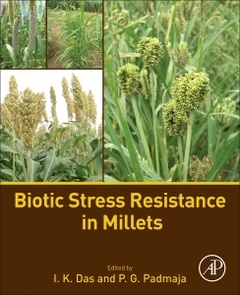Description
Biotic Stress Resistance in Millets
Coordinators: Das I. K., Padmaja P. G.
Language: English
Subject for Biotic Stress Resistance in Millets:
Support: Print on demand
Description
/li>Contents
/li>Biography
/li>Comment
/li>
Biotic Stress Resistance in Millets presents an important guide to the disease and pest-related challenges of this vital food crop. Biotic stresses are one of the major constraints for millet production, but newly emerging and forward-thinking problems with disease and insect pests are likely to increase as a result of changing weather, making this an imperative book on best practices.
Current strategies are mainly through the development of resistant cultivars, as the use of chemicals is cost-prohibitive to many of those producing millet in developing countries where it is of most value as a food source. This book explores non-chemical focused options for improving plant resistance and protecting crop yield.
This single-volume reference will be important for researchers, teachers and students in the disciplines of Agricultural Entomology, Plant protection, Resistance Plant Breeding and Biotechnological pest management.
Part I: Introduction to Millets
Chapter 1. Millets, Their Importance, and Production Constraints
Part II: Diseases and Insect Pest Resistance
Chapter 2. Disease Resistance in Sorghum
Chapter 3. Disease Resistance in Pearl Millet and Small Millets
Chapter 4. Insect Pest Resistance in Sorghum
Chapter 5. Insect Pest Resistance in Pearl Millet and Small Millets
Part III: Striga and Weeds
Chapter 6. Striga: A Persistent Problem on Millets
Chapter 7. Weed Problem in Millets and Its Management
He started his career as Scientist in Agricultural Research Service in 1997, and served for 18 years in the Indian Institute of Millets Research, Hyderabad in various positions. He has made an outstanding contribution in the field of sorghum disease management using host resistance. Identified new resistant sources for major diseases of sorghum and contribute to development of superior cultivars. He developed biocontrol agents for management of soil-brone disease and seed quality improvement for panicle disease of sorghum. First time he reported anatomical markers for assessing charcoal rot resistance in sorghum. Basic studies on Macrophomina phaseolina first time indicated that chlorate sensitivity in M. phaseolina had relations with its pathogenicity. Handled projects with national and international funding and published around 50 research articles in reputed journals in India and abroad including, Microbiological Research, Crop Protection, Crop Science, Canadian Journal of Plant Pathology, Phytoparasitica, Current science, Food Control, Journal of the Science of Food and Agriculture, Journal of Agricultural Science (Cambridge), Euphytica, European Journal of Plant Science and Biotechnology, Indian Phytopathology, Indian Journal of Agricultural Sciences. He has guided students for their post graduate and doctoral studies. He is also the Fellow of Indian Phytopathological Society (2015) and life member of many professional societies.
Dr PG Padmaja, Principal Scientist in Agricultural Entomology at the ICAR- Indian Institute of Millets Research (for
- Establishes basic concepts of host resistance providing foundational insight
- Synthesizes past biotic stress resistance research with the latest findings to orient research for future strategies for plant protection
- Focuses exclusively on host plant resistance on all major diseases and pests of millets
- Presents data and strategies that are globally applicable as millets gain importance as a health food




